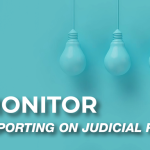
Number 2: Judicial Monitor – Monitoring and Reporting on Judicial Reforms
16/11/2024
N1.T2 – Ninth Attempt to Elect the President of the Supreme Court of Montenegro
20/11/2024N2.T7 – Who Will Remain to Adjudicate in the Special Department of the High Court in Podgorica?
HRA NEWSLETTER 2 – TOPIC 7
The challenges facing the Special Department of the High Court in Podgorica became evident in October when the court revealed that only six judges are currently handling its most complex criminal cases, with an alarming backlog of no fewer than 160 cases. The situation is further complicated by the fact that four of these judges—Vesna Kovačević, Sonja Keković, Nenad Vujanović, and Igor Djuričković—have applied for advancement and intend to transition to roles as Appellate Court judges, potentially reducing the workforce in this crucial department even further.
The departure of these judges could have significant ramifications for ongoing trials, necessitating a restart of proceedings from the beginning.
In her recent interview with the Judicial Council regarding the operations of the Special Department, Valentina Pavličić, the newly appointed President of the Supreme Court, emphasized that cases involving corruption and organized crime cannot be processed in the same manner as before. She noted that each specialized judge should have a personal work program outlining how they will manage their cases. Pavličić acknowledged that while the judges have the right to pursue advancement, it would be “honorable” for them to conclude the cases they are currently overseeing before transitioning to new roles.
The NGO Human Rights Action (HRA) has expressed concern regarding the potential advancement of judges from the Special Department, highlighting the urgency of ongoing trials.
HRA’s Bojana Malović stated, “We do not have the luxury for judges in the Special Department to advance, especially when serious proceedings are already facing delays. This could lead us back to square one, where a significant number of defendants currently in custody might be released, thereby increasing the risk of flight and complicating judicial processes further. It is imperative that these judges recognize the gravity of their responsibilities at this time”.
Attorney Veselin Radulović echoed these concerns, warning that the transfer of judges to the Appellate Court could result in a lack of available adjudicators in the High Court.
Among the notable cases pending in the Special Department is that of former Supreme Court President Vesna Medenica and suspended Commercial Court judge Milica Vlahović-Milosavljević, which has faced postponements on seven occasions. The most recent delay was due to judge Nada Rabrenović’s sick leave, and there is uncertainty about whether the case will be reassigned to another judge.
In a positive development, the Judicial Council announced on November 8 that it will consider, without delay, options for increasing the number of judges in the Special Department of the High Court in Podgorica.
HRA NEWSLETTER 2
- N2.T1 – After four years, the Supreme Court of Montenegro finally has a President: Valentina Pavličić
- N2.T2 – Indictment Control Phase for Tunnel Dug Beneath High Court
- N2.T3 – Judges’ Strike Postponed as Negotiations with Authorities Progress
- N2.T4 – HRA Survey: One-Third of Judges and Prosecutors Perceive Corruption in the Judiciary
- N2.T5 – Judicial Council Confronts Politicians, Opens Sessions to the Public
- N2.T6 – Judicial and Prosecutorial Councils Incomplete; No Response from Political System Committee
- N2.T7 – Who Will Remain to Adjudicate in the Special Department of the High Court in Podgorica?
- N2.BN – BRIEF NEWS





 English
English